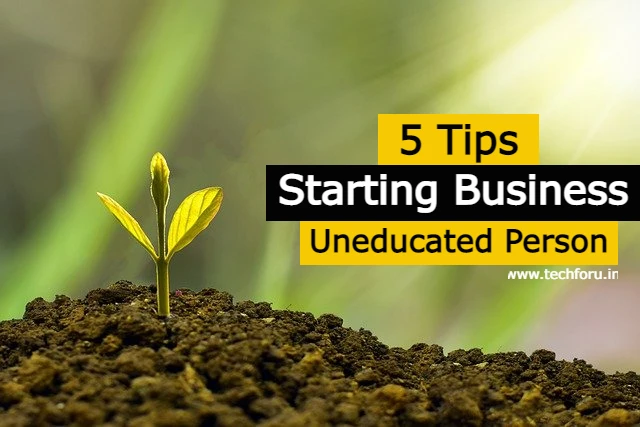Business Tips: Starting your own business can be extremely rewarding, both personally and financially, but it also requires a significant amount of work and planning, even if you’re coming from an educational background that has little to do with the industry in which you’re hoping to start your own business. For those of us who aren’t so lucky when it comes to education, there are ways to still get the ball rolling on launching your business idea; here are five tips for starting a business as an uneducated person.

1) What kind of business you should start
Generally, people think of starting businesses like restaurants, supermarkets or repair shops. In reality, you can start any kind of business without much education. Here are some different types of businesses you can start with less than a degree in a related field: 1) Consulting Service – The consulting industry is big business and it is generally easier to succeed if you are not going head-to-head with established companies or big brand names. 2) E-commerce Website – Selling items through your own e-commerce website will give you complete control over your margins and bring in additional revenue that many local retailers don’t have access to.
2) How to prepare your business plan
Although many business owners know that they need to come up with a business plan, they may not realize how much work goes into actually putting one together. To prepare your business plan, you’ll want to start by learning about your idea. Make sure you clearly understand what it is and how it will benefit customers or clients. You’ll also want to get really clear on your target audience—the people who have the most need of your product or service. Once you’ve figured all that out, you can start creating your marketing strategy and financial model. This isn’t going to be easy but if you just keep at it and don’t give up, soon enough you’ll have yourself a real-deal company!
3) Financing your business
It’s pretty unlikely that anyone would start a business in life without knowing how they were going to pay for it. Even if you can afford to cover all of your expenses from savings, it’s important to have enough cash on hand so that you can tide yourself over in case your business starts slowly and you don’t immediately start bringing in revenue. For most new businesses, early funding comes from personal savings or other personal assets. When thinking about how much money you will need to live on while your company is getting off the ground, be realistic with yourself. You might end up exhausting your savings account before your new business really gets rolling—and that’s okay! It just means that now is not yet the right time to start a business.
4) Legal issues when starting a business
A ton of people dream about starting their own business, but few actually follow through with it. There are many reasons why so many people never actually get off of the ground. One big reason is that they just don’t know how to get started. Even if they do manage to start a business, one legal problem or another can bring them down before they ever have time to build up enough momentum to keep going strong. So many entrepreneurs never even take off because they make mistakes at critical moments in their growth; mistakes that could have been avoided with better planning and preparation.
Read| 10 Low Investment Business Ideas in India 2022
5) Common myths about starting a business
(1) I’m not educated, (2) I don’t have enough experience, (3) I don’t have enough money, and (4) I don’t know what business to start. Do any of these myths sound familiar? You might be surprised to learn that all of them are misconceptions about starting a business. After all, you can always start small or work on something part-time while still employed elsewhere. And there are plenty of ways to acquire new skills—there are even plenty of free resources out there—so education doesn’t need to be expensive or difficult.
6) Starting Small
Many of us may feel we’re too uneducated to start our own business, but that doesn’t mean you can’t get started. In fact, many successful entrepreneurs don’t have much in terms of formal education—after all, starting a business is about identifying your passions and working with what you know, not what you don’t. If you love baking, try starting a part-time food truck or home-based cake business on weekends. If dance is your thing (with or without formal training), create video tutorials on YouTube and monetize them through ads or products like t-shirts.
Wrapping up
Ideas & Resources to Get You Started. Give Yourself Permission to Make Mistakes and Learn Along The Way. Don’t worry if your idea isn’t perfect; it doesn’t have to be, and never will be. All you have to do is get started (something most people won’t do), learn along the way, and focus on being persistent (the one quality that will guarantee success).